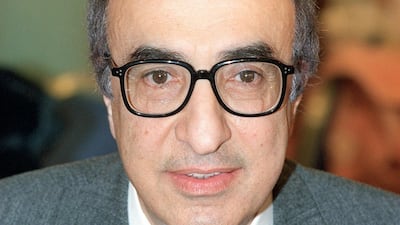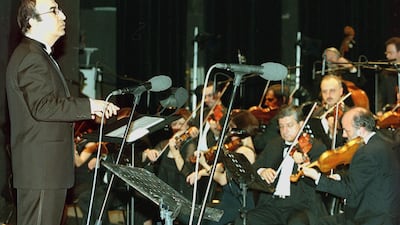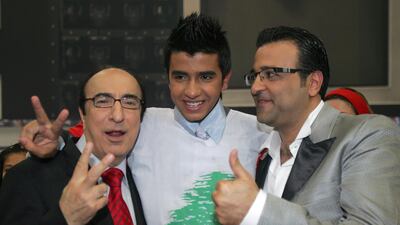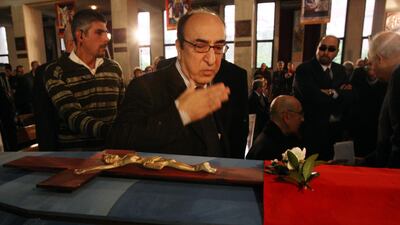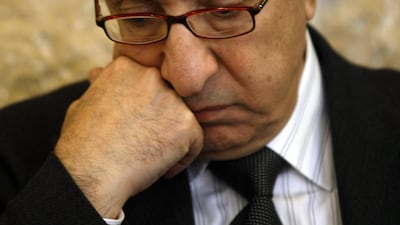Elias Rahbani, one of Lebanon's most renowned composers and lyricists, has died aged 83.
Elias, the youngest of the three Rahbani Brothers, a trio of composers, died on Monday, January 4, the Lebanese press reported.
He leaves behind his wife, Nina, and two sons, composer Ghassan and Jad Rahbani.
Lebanese pop star Elissa took to Twitter to pay tribute, praising Rahbani's flair and originality.
"An honest, loving, and creative artist in every sense of the word, and a person who would never exist again with his instincts, talents and eternal deeds," she said. "May God have mercy and all condolences to your generous family."
Compatriot and singer Carole Samaha said Rahbani's death was the end of an era.
"He took with him the most beautiful musical era in the history of the Lebanese song," she said. "Your deeds are immortal in memory and conscience. I extend my deepest condolences to the entire Rahbani family, especially Nina, Jad and Ghassan."
Syrian singer Assala passed her condolences to all Lebanese people, who will be mourning the loss of a musical giant.
"May God have mercy on him and forgive him and compensate Lebanon for all of this sadness," she said. "He was great, kind and compassionate."
Lebanese singer-songwriter Mike Massy posted a 2015 video where he shared the stage with Rahbani.
"I met the outstanding Elias Rahbani twice in my life. Once when he attended my concert in Douma and when I had the honour to share the stage with him,” he said. “So many beautiful melodies will resonate for decades after you left us.”
Emirati star Hussain Al Jassmi also posted his tribute to an artist and colleague. "Goodbye my friend. May God have mercy on you, forgive you and give your family and loved ones patience," he said.
Lebanese film composer Ziad Boutros said: "May God have mercy on you Professor Elias."
Born in the town of Antelias, Rahbani built a prolific, near six-decade career in which he released more than 2,000 songs and composed scores for more than 20 films.
After studying piano and composition at the Lebanese Academy and receiving private instruction from French pianist Michel Bourgeot and compatriot composer Bertrand Robillard, Rahbani joined Radio Lebanon as a music adviser from 1962 to 1972.
The hours he spent listening to classical and orchestral Arabic music on air informed his own burgeoning songwriting career, and he often blended Levant melodies and Lebanese poetry with western classical music arrangements.
His poignant and dramatic style was perfectly suited for some of Lebanon's most formidable singers, with key tracks sung by Fairouz (Hanna El Sekran, Tair el-Warwar and Kan Enna Tahoun), the late Wadih Al Safi (Ya Bou Mur'ee) and Majida El Roumi (Aam Behlamak Ya Helm Ya Lebnan).
Despite his own success, Rahbani's career was always compared to the bigger achievements of his older brothers, Assi and Mansour, who are best known for their pioneering work with Fairouz – they composed many of her best songs – as well their landmark operas performed at the Baalbeck International Festival.
In an in-depth interview on Lebanese television programme Bayt Al Qaseed in 2017, Rahbani said he never begrudged the achievements of his siblings and went on to note his own success.
"I never felt disadvantaged," he said. "That's because it was unheard of that BBC Arabic would ask a 19-year-old such as myself to compose 40 songs and to record and produce 13 programmes. "So when I launched my career, I did it in a very strong way."
It was a rare, and for Rahbani, a seemingly uncomfortable moment of bravado.
He admitted on the programme that he never chased the limelight and instead preferred to focus on producing quality works.
When asked how he managed to reign in his ego, despite the history and acclaim that comes with the Rahbani family, he said it was down to a gentle and easy-going nature.
"I have always been level-headed," he said. "I always approach people with love and forgiveness."
